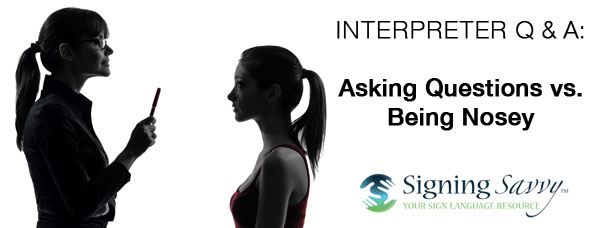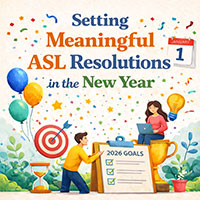
Interpreter Q & A: Asking Questions vs. Being Nosey
This article is part of our "Dear BC, Interpreter Q & A” series, which answers questions on interpreting and Deaf culture from multiple perspectives. There isn’t always one “right” answer to every question, and different people have different opinions on how to handle different scenarios. That is why more than one perspective is provided in this series, however, more opinions always exist. These perspectives are gathered from talking with experienced interpreters and deaf consumers from across the United States and Canada and do not solely come from the author.
In an educational setting, a student asked me to accompany her to interpret a conversation with one of her teachers. On the way to the teacher’s classroom, I asked “What did you need to see the teacher for?” The deaf student responded, “It’s none of your business, you are the interpreter and you will do what I tell you to do!” Needless to say, I was shocked at this answer.
I always try to prepare myself and avoid misunderstandings. For example, before going into a doctor’s office, I ask the client why they’re there, to prepare myself as well as to get a feel for the client’s signing style, etc. I’m not being nosey and I feel this response was very curt and rude. Is this how we are viewed?
Sincerely,
Not trying to be nosey
An Experienced Interpreter's Perspective:
I think there are a number of issues at play. First, there is your question and reasoning behind it. I applaud your rationale. You were trying to be prepared for the event and to try and gauge the Deaf person’s sign style/preference. That’s great! However, I wouldn’t have asked why the student wanted to see the teacher. It may be misconstrued as fishing for information.
If this was a first-time assignment, I think the most I might ask would be, “What does the teacher teach?” That way, the subject being taught would prime my brain for certain terms and/or grammatical aspects of ASL/English.
If you’re trying to measure a young student’s signing preference, you could ask about another less threatening topic. One question I use is “What is your favorite game?” Lots of times, young kids will answer by talking about their favorite video game. They’re more relaxed and it helps me find a good starting point for matching their preferences.
The second issue is the Deaf student’s response. Remember that she’s young and part of being a student is learning how to be a savvy yet polite consumer. If this educational setting is your full-time position, you should talk with the student as soon as you can after the interpreting event. Be honest but not authoritative. Remember, diplomacy can be your best friend. You might want to tell her that it always helps the interpreter to have something to start with, both content and communication preferences, so that you can be ready to interpret. This way the student might volunteer necessary information next time without an interpreter having to ask.
Experienced Deaf Consumer's Perspective:
That sounds familiar to me. I have seen and heard this reaction from students. I believe the student is learning how to utilize an interpreter. Some students will use too much power without common sense. Often, deaf students are told that interpreters do not have the right to be nosey about their personal lives, but at the same time they do not understand how the Code of Ethics really works for them. This student probably didn’t even think ahead about the fact that the interpreter is going to find out what the topic will be in a few moments anyway. They just don’t know why you are asking those kinds of questions.
After the initial meeting – not right away, but later on – you should have a nice comfortable talk with the student about why you ask those kinds of questions. Explaining this would be beneficial. Some students need help learning how to utilize interpreters and what to expect later in the deaf community. Eventually, the student can decide whether the interpreter’s questions are appropriate prior to situations. This student is still learning.
ADVERTISEMENTS
 Brenda Cartwright is a Coda, seasoned interpreter, a master teacher, well known presenter, and author of several best selling sign language and interpreting textbooks from the RID Press. For 35 years Brenda was the Chair of the Sign Language Interpreter Program at Lansing Community College in Lansing, Michigan.
Brenda Cartwright is a Coda, seasoned interpreter, a master teacher, well known presenter, and author of several best selling sign language and interpreting textbooks from the RID Press. For 35 years Brenda was the Chair of the Sign Language Interpreter Program at Lansing Community College in Lansing, Michigan. Interpreter Q & A: How to Handle Rude Clients
Interpreter Q & A: How to Handle Rude Clients The Role of the Interpreter in the Classroom
The Role of the Interpreter in the Classroom Interpreter 4-1-1: What to Pack in Your Interpreter Bag
Interpreter 4-1-1: What to Pack in Your Interpreter Bag






